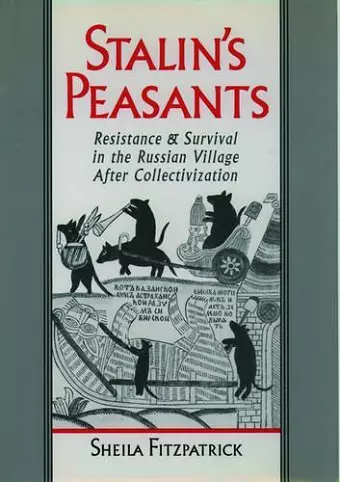Stalin's Peasants
Resistance and Survival in the Russian Village After Collectivization
Format:Paperback
Publisher:Oxford University Press Inc
Published:5th Dec '96
Currently unavailable, currently targeted to be due back around 4th February 2025, but could change

Winner of the Heldt Prize of the Association for Women in Slavic Studies; Named an Outstanding Academic Book for 1995 by ^IChoice^R
Drawing on Soviet archives, especially the letters of complaint with which peasants deluged the Soviet authorities in the 1930s, this work analyzes peasants' strategies of resistance and survival in the new world of the collectivized village.The collectivization of Russian farms was the cornerstone of Soviet agricultural policy during the 1930s. Fitzpatrick's book, about Soviet forced collectivization and its impact on the Russian village, will be the first in Western or Soviet literature to explore the dramatic transformation of peasant life caused by collectivization. It is based on new and unknown material from recently-opened Soviet archives. In this richly textured and fascinatingly detailed book, the author analyses the peasants' strategies of resistance and survival in the state-inflicted drama of the collectivized village. For the first time it is possible to see real people behind the facade of the Soviet propaganda account of the happy "Potemkin Village". The regime's own strategy involved humiliation and violence. Fitzpatrick's study is truly a landmark in studies of the Stalinist period - a thickly-documented social history told from the traumatic experiences of that long-suffering underclass of peasants. Her study has been called a "breakthrough" by specialists in her field and will affect how the history of the Soviet period will be done by subsequent generations of scholars.
In this pathbreaking study, Sheila Fitzpatrick portrays collective farm life in the 1930s from the perspective of the peasantry ...Stalin's Peasants is an accessible and fascinating glimpse into the Soviet countryside. * Journal of Social History *
A pioneering piece of historical sociology that delineates the deplorable reality of ideological utopias. * ALA Booklist *
Fitzpatrick makes her account vivid with quotations of first-person experiences, but she resists the temptation to oversimplify the issues. Highly detailed--a must for students of Soviet, or social history. * Kirkus Reviews *
Stalin's Peasants is well-researched and richly detailed. It adds a great deal of new information on rural conditions and attitudes in the 1930s. No other work comes close to it in recounting the tragedy of collectivization from the peasant's point of view. * Times Literary Supplement *
This is an outstanding contribution both to the history of the USSR and the social history of peasants by a remarkable historian. She makes us hear the Russian peasants of the Stalin era speak (largely via hitherto closed archival records) and the echo of their voices in post-Soviet Russia today. * Eric Hobsbawm, The New School for Social Research *
Fitzpatrick's study is truly a landmark in the historiography of the Stalinist period of Soviet history, something that has been long overdue--a thickly documented social history of 1930s, not from the perspective of the "system" of Stalinism, but of the traumatic experiences and changes in life texture of that long-suffering underclass, the Russian peasantry. * Allan Wildman, Ohio State University *
With prodigious energy and diligence in newly-opened archives and employing the theoretical insights of recent historical and anthropological studies, Sheila Fitzpatrick shows how in the Russian village after collectivization peasants used the `weapons of the weak' to pry from the Stalinist state what they needed in order to survive. She tells a tragic story filled with small triumphs by the subaltern in dynamic and moving prose. This is an empirical and conceptual tour de force. * Ronald Grigor Suny, The University of Michigan *
Sheila Fitzpatrick has written yet another path-breaking book, introducing us once more to an untold history and hitherto unused sources. She shows that Stalin's peasants were unmistakably kin to the peasants of Peter and Catherine, and the two Nicholases. They resisted the often unbearable pressure of the state as best they could, exploited the regime's dependence upon peasant cooperation, adopted the language of the regime as they pursued their own intravillage feuds, and remained cynically indifferent to the regime's goals. * John Bushnell, Northwestern University *
Sheila Fitzpatrick's important Stalin's Peasants. Resistance and Survival in the Russian Village after Collectivization ... fills a major gap in our sources ... the first comprehensive study of the collectivized peasantry in the 1930s by a social historian. Professor Fitzpatrick has scrutinized a vast range of published and archival sources ... These rich materials have enabled her to provide a wide-ranging and well-grounded account of Soviet rural society ... this book of essays is stimulating and contains much original material. * R.W. Davies, University of Birmingham, EHR Nov. 96 *
- Winner of Winner of the Heldt Prize of the Association for Women in Slavic Studies; Named an Outstanding Academic Book for 1995 by ^IChoice^R.
ISBN: 9780195104592
Dimensions: 235mm x 156mm x 28mm
Weight: 576g
416 pages